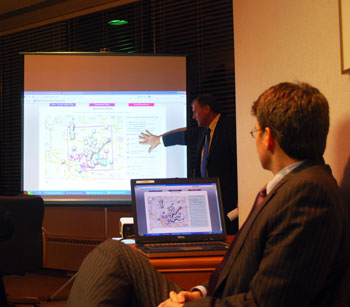Ann Arbor Transportation Authority board meeting (Nov. 17, 2011): The board’s agenda Thursday night contained two items that were fairly uncontroversial.

Ben Carlisle mans the laptop for the projection onto the screen as his father Dick Carlisle explains to the unincorporated Act 196 (U196) board how an online community input tool can be used to map out suggestions from attendees at public forums. The men are with Carlisle Wortman Associates, an Ann Arbor consulting firm hired by the AATA to help with district planning meetings. The U196 meeting took place on Nov. 14. (Image links to the online participation tool.)
One item was the ratification of a new policy on public input for changes in bus fares and schedules. When the board arrived at the item on the agenda, board member David Nacht, who was first to speak to the issue, suggested the issue was so straightforward that the board could vote immediately.
The board unanimously approved the new public input policy, which distinguishes between major and minor changes to fares and routes, and provides a range of ways that the public is to be notified about such changes. The policy also includes a range of ways the AATA will receive the public’s feedback on such changes.
Another item generating little controversy at the board table was approval of an increase to the number of buses running on the Washtenaw Avenue corridor – between Ann Arbor and Ypsilanti, which is served by AATA Route #4. Again, Nacht led off board discussion on the issue, calling it a “no-brainer.” At the conclusion of his brief remarks, he declared, “Let’s vote!” Others had more to say, but the board eventually approved the increased bus frequency – up to eight buses per hour during peak periods.
Nacht’s apparent eagerness to dispatch with those items with extra efficiency could be attributed to a hour-long closed session the board had held before those votes.
The session was held to deliberate on a request from the American Civil Liberties Union that the AATA accept an advertisement for the sides of its buses that had been previously rejected. When the board emerged from the closed session – held to consider a written opinion of its legal counsel, which is allowed under the Michigan Open Meetings Act – the board voted to affirm the rejection of the ad. The ad includes the text, “Boycott ‘Israel’ Boycott Apartheid.”
In addition to taking those three votes, the board entertained its usual range of committee and staff reports, including updates on a possible transition by the AATA into a countywide authority. Those updates included a report on the second meeting of the U196 – an unincorporated board of a countywide transit authority likely to be formed under Michigan’s Act 196 of 1986.
Another update connected to countywide expansion related to progress on a four-way agreement between Ann Arbor, Ypsilanti, Washtenaw County and the AATA. The four-way agreement would establish the contribution of Ann Arbor and Ypsilanti millage funding to the new countywide authority, and set the role of Washtenaw County to incorporate the new authority.
CEO Michael Ford also announced a $2.1 million federal grant the AATA had received (in addition to a previously announced $2.65 million grant in October) to fund the incremental cost of purchasing hybrid-electric buses.
Thursday’s meeting likely marked the penultimate monthly AATA board meeting for Sue McCormick, who is currently public services area administrator for the city of Ann Arbor. She’s leaving that position to take a job, beginning at the start of 2012, leading Detroit’s water and sewerage department. [Full Story]




